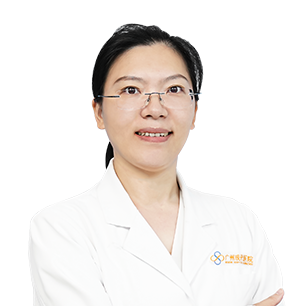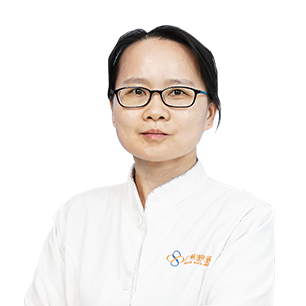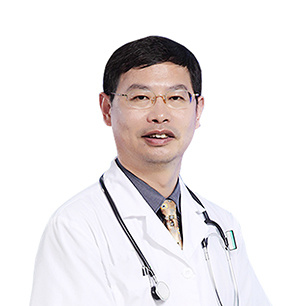 Views:127
Views:127 2025-04-07
2025-04-07 Share
Share
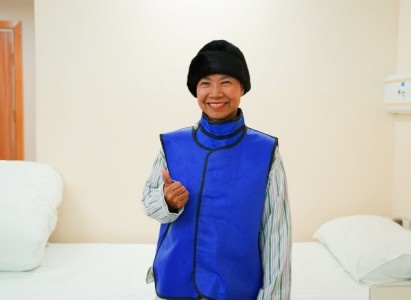
- Nguyen Thị Giang Thanh Vietnam
- Diseases:Breast cancer
- Treatment programs:interventional therapy + seeds implantation
Nguyen Thị Giang Thanh Thanh, 58 years old, is from Hanoi, Vietnam. In November 2017, she was diagnosed with breast cancer, and her pace of life suddenly accelerated, and she embarked on a journey to fight cancer. She faced the challenge actively, undergoing surgery, 8 chemotherapy, and 25 radiotherapy sessions, and persisted in a regular review for 6 years. Although the treatment process was full of hardships, her condition was stable, which made her think that she could finally take off the burden of fighting cancer and return to normal life.
However, in June 2023, the cancer recurred and accompanied by lymph node metastasis, putting her in trouble again. She returned to K Hospital in Vietnam and started oral targeted drug treatment. She had not achieved any results for a whole year, and the lymph nodes continued to enlarge. At the doctor's advice, she adjusted the treatment plan. However, after three consecutive treatments, not only did the condition not improve, but the lymph nodes in the neck were still growing and even began to suffer. In desperation, she had to suspend all treatments.
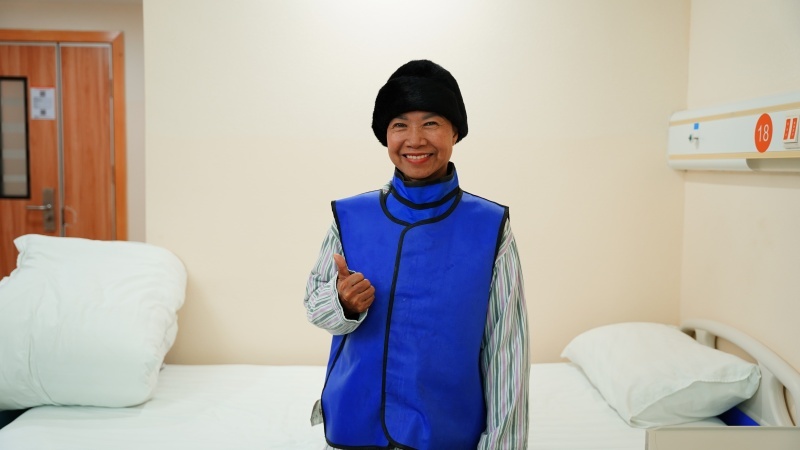
In just two months after the treatment was stopped, her condition worsened sharply - the mediastinum and clavicle lymph nodes quickly enlarged, compressing the blood vessels, causing her to cough frequently and even have difficulty breathing. In the end, due to pericardial and pleural effusion, she was rushed to the Vietnam Cardiovascular Hospital for emergency treatment. The doctor drained her through her chest cavity and discharged a full 2 liters of fluid, which temporarily alleviated the crisis.
A turning point in desperate situation
Nguyen Thị Giang Thanh Thanh was almost in despair during treatment at a cardiovascular hospital in Vietnam. The doctor advised her to go back to K Hospital to continue treatment, but her past failures made her afraid to take risks. At this moment, a friend who was treated at St. Stamford Modern Cancer Hospital Guangzhou encouraged her: "Come to China and try it!" This simple sentence became a turning point in her life.
Through the Vietnam Ho Chi Minh International Service Center, she communicated remotely with the MDT expert team of St. Stamford Modern Cancer Hospital Guangzhou. After the evaluation, the expert gave 70%-80% hope for treatment, which made her and her husband resolutely decide to embark on the road of cross-border medical treatment. In just 10 days, they arrived in Guangzhou. The thoughtful pick-up service at the airport to the hospital, the warm clothing prepared by the staff, and the seamless admission process all made this exotic couple feel the long-lost peace of mind.
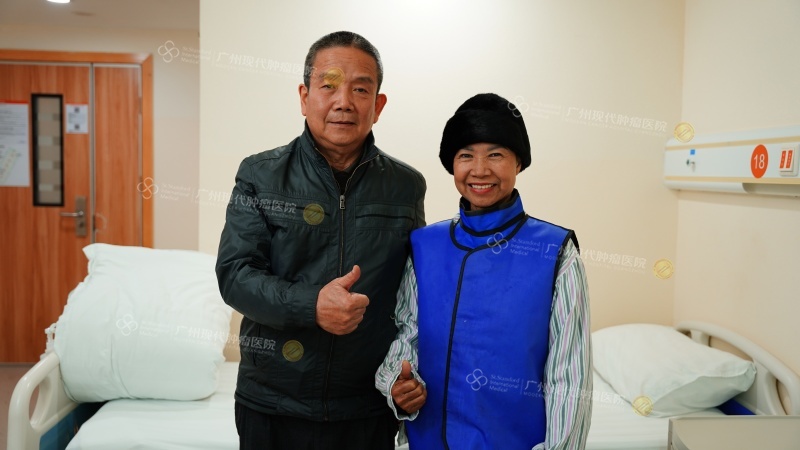
Precise minimally invasive treatment: rekindling the spark of life
Upon her arrival in Guangzhou, Nguyen Thị Giang Thanh Thanh was in an extremely weak condition, suffering from persistent coughing and difficulty breathing due to pericardial and pleural effusion. The hospital promptly performed a pleural drainage to alleviate her symptoms and tailored a "dual approach" treatment plan for her—combining arterial interventional chemotherapy with particle implantation.
"The treatment method here is completely different from that in Vietnam, especially seed implantation technology, which is not available in Vietnam at present." She sighed. Zhang Ruiying, attending physician, explained: "Traditional intravenous chemotherapy allows drugs to spread throughout the body, with obvious side effects; while arterial interventional chemotherapy directly delivers the drug to the tumor blood supply aorta through a catheter, making the concentration of chemotherapy drugs in the tumor reach 2-8 times that of intravenous chemotherapy, greatly reducing the side effects of the body. Radioactive seeds are more like the "guardian of continuous combat". Each particle can continuously release low-dose γ rays, inhibiting cancer cell DNA replication continuously within 180 days, achieving the dual effects of 'precise strike' and 'long-lasting control'."
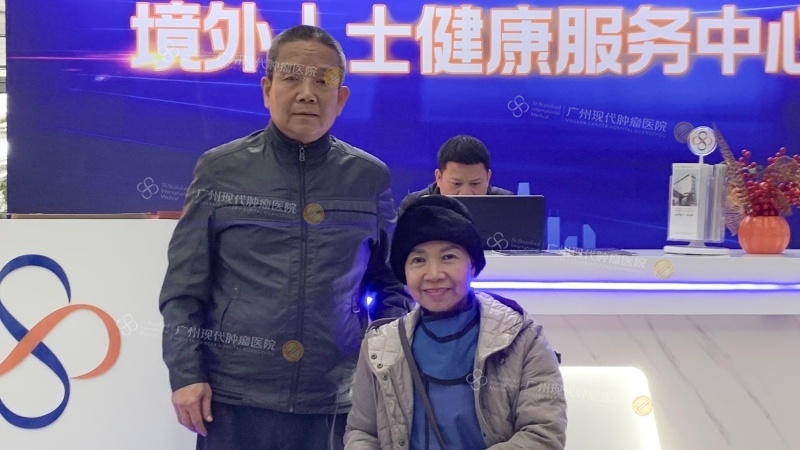
"The doctors are professional! In sensitive areas such as the neck and mediastinum, 72 seeds can be implanted accurately, and I had almost no discomfort during the entire treatment. The CT after the second treatment showed that the pericardial and pleural effusion had been effectively controlled, the tumors in the implanted seed area were reduced by 80%, and some lesions even disappeared completely." She said happily.
Since then, she has traveled to and from China and Vietnam every 21 days and plans to complete 6 rounds of treatment. What made her even more gratified was that the hospital combined traditional Chinese and Western medicine treatments to help her relieve the fatigue caused by chemotherapy. "The doctor responded quickly to every symptom, and this feeling of being valued gave me more confidence to persevere."
Cost and efficacy: A worthwhile adventure
The cost of transnational treatment was once her initial concern. Compared with public hospitals in Vietnam, the treatment costs and transportation costs here are indeed a considerable burden for ordinary families. But she admitted that if compared with private hospitals in Vietnam such as Vinmec and some public hospitals with better conditions, it would be 20%-30%. She stressed that what is more important is the quality of service and efficacy here: "When you see the tumor shrink and your body gradually recover, you will feel that every penny is worth the money."
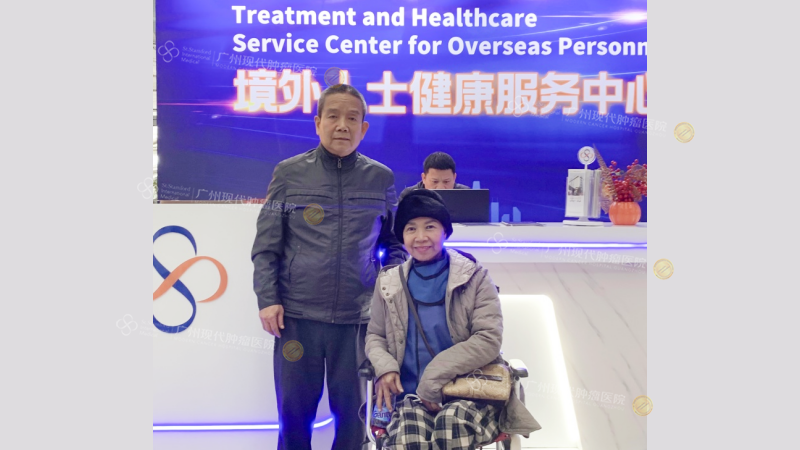
As an "experienced person", Nguyen Thị Giang Thanh Thanh hopes that more Vietnamese patients can broaden their horizons: "If conditions permit, you might as well consider cross-border combined treatment, such as first controlling the disease in China, and then returning to Vietnam for radiotherapy." She mentioned a young friend who also had breast cancer and unfortunately passed away due to local treatment, which strengthened her determination to share her experience: "Even if a person can be rescued, my experience will be meaningful."
Gratitude and Wish
Today's Nguyen Thị Giang Thanh Thanh is full of gratitude in her words. She sincerely thanked all the medical staff of the hospital for their professionalism and care and also thanked her for her destiny, which allowed her to find vitality in desperate situations. But her wish goes far beyond that: "I hope that Vietnamese hospitals can cooperate with the St. Stamford Modern Cancer Hospital Guangzhou to allow this precise minimally invasive technology to benefit more patients. Too many people missed the opportunity for treatment due to information occlusion..."
Faced with the recurrence of cancer, she didn’t choose to give up, but bravely looked for new possibilities. Minimally invasive treatment not only helped her control her condition, but also rekindled her hope for life!












